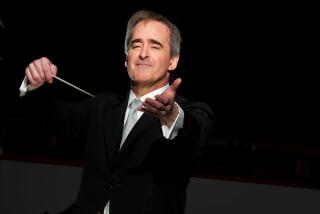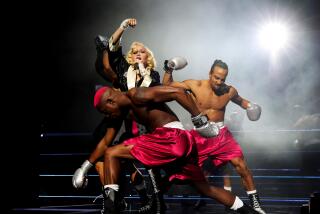A Grande Dame’s Grand Return : Music: After 19 years away, with a new biography in hand, Renata Tebaldi comes back to the United States and adoring crowds at the Met.
NEW YORK — Despite frigid temperatures Tuesday afternoon outside the Metropolitan Opera’s Founders Hall, more than 1,200 people lined up for hours to see her. Twenty-four hours earlier, Mayor Rudolph Guiliani had decreed Dec. 11 her day in New York City. Renata Tebaldi, one of the greatest Italian lirico spinto sopranos since World War II, triumphantly had returned to America and the Met after a 19-year absence.
“And the voice . . . the incomparable voice,” rhapsodized the opera-loving mayor in his Renata Tebaldi Day proclamation. “Brava Tebaldi, brava Tebaldi,” chanted the crowd, as she exited her limousine on her way into Founders Hall. “She remembers me! She remembers me!” exclaimed Charles Anthony, a veteran character tenor, after a warm greeting from Tebaldi at the opera house.
The singer, who had made her New York debut in 1955 as Desdemona in “Otello,” was in town to promote her authorized biography, “Tebaldi, the Voice of an Angel,” by Carlamaria Casanova, which has just been published in English. Specifically, she was scheduled for a book signing at the Met from 1 to 3 p.m. Faced with the crowds, the Met management extended the event first to 4:30 p.m., then, with a 6 o’clock curtain impending, they were forced to move her, her fans and her books to an adjacent gallery where she was still signing at 7 p.m.
“I know America is the country that loved me best,” Tebaldi, 73, said in a conversation shortly before the book signing began. In Italian and English, she gave her explanation for why she had been away so long. “After I quit in 1976, I suppose I became lazy and just wanted to stay home. One day, my coach called me and I told him not to come, that I didn’t want to sing anymore. I didn’t have to worry about catching cold. I could stay up late. I even started to smoke.”
Her age shows hardly at all. The beloved two-octave voice, with its immense variety of color and dynamics, may be gone, but the creamy complexion and the Elizabeth Taylor blue eyes are unmistakable. Her coal-black hair is now auburn, her figure is ballerina straight, and she still commands an audience with the authority she practiced on stage.
“I was at her first rehearsal at the old Met on the roof stage,” remembered opera timpanist Richard Horowitz, who came to Founders Hall to get a glimpse of Tebaldi. “She just blew everybody away!”
A young man in his early 20s had his own epiphany on Tuesday. “I’ve never heard a voice like it!” he said, speaking of her recordings, and looking a little starry-eyed after having gotten her autograph.
*
Since she retired, Tebaldi has kept her distance from opera. “I don’t teach,” she said. “I hate competitions. So many of them are decided in advance. I would hear some girl sing ‘Aida’ when she should be singing ‘Sonnambula,’ but that’s the way things are these days. I would point it out, and be the only one. Everyone wants to sing everything, which is why they don’t last.”
Today’s singing discourages her, she said, and she rarely attends a performance, calling it “too painful.”
“The pitch continues to rise, because the conductors want a more brilliant sound. That’s fine for a symphony, but it’s ruinous for the voice. That’s why there are not true dramatic voices anymore. You think a baritone is supposed to sound like a tenor? Of course, there are no contraltos.
“I cannot think of one person singing today who would have made a career when I was at my peak, along with Mario Del Monaco, Giuseppe Di Stefano, George London, Leonard Warren, Cesare Siepi, Giulietta Simionato and, of course, Maria.”
She is referring, of course, to Maria Callas. Their great rivalry has filled chapters of many opera books. Now Tebaldi looks back on it with resigned amusement.
“It was mostly our admirers,” she said. “There was plenty of work for both of us. We had completely different voices. I would never think of singing Lucia, and every time she entered my repertory--Fedora, Butterfly, Maddalena in ‘Chenier’--she had no success.” (Apparently Tebaldi forgot Violetta and Tosca.)
These days, Tebaldi spends most of her time being “honored,” as she has put it in the past. She lives in an elegant condominium in Milan, and in the summer, her apartment overlooking the Adriatic in San Marino. She receives visitors from all over the world. She could never bear to hear her recordings while she was still singing, but now she says she listens to CD reissues with pleasure. “They’re rather good, aren’t they?” she asked.
And she takes in the sort of adoration that has met her in New York City the way a desert flower soaks up rain. When the mayor kissed her at City Hall, she didn’t bat an eyelash. “He acted like a schoolboy,” she said. “He kissed me twice, so I kissed him a third time.”
For those who might worry that a favorite prima donna hasn’t put enough money aside for her later years, merely looking at the jewelry Tebaldi is wearing will dispel the thought. Her time on the stage may be over, but obviously diamonds are forever.
More to Read
The biggest entertainment stories
Get our big stories about Hollywood, film, television, music, arts, culture and more right in your inbox as soon as they publish.
You may occasionally receive promotional content from the Los Angeles Times.










